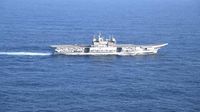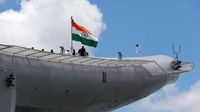In a dramatic escalation of hostilities between India and Pakistan, the Indian Navy has launched a significant offensive against Pakistan, targeting key locations including Karachi and Ormara from the Arabian Sea. This operation, initiated on May 8, 2025, follows a series of retaliatory actions by the Indian Armed Forces in response to a wave of aerial attacks from Pakistan.
Reports indicate that the Indian Navy's aircraft carrier, INS Vikrant, has been mobilized, unleashing a barrage of missiles that have caused extensive damage and fires across Karachi, particularly at the port. The attack on Karachi, which houses critical bases of the Pakistani Navy, marks a pivotal moment in the ongoing conflict.
According to defense sources, the strikes from INS Vikrant have led to massive fires engulfing both Karachi and Ormara, forcing residents to flee inland amid rising panic. The Indian Navy's actions come after a coordinated assault on May 7, targeting nine terrorist sites in Pakistan and Pakistan-occupied Kashmir under Operation Sindoor, which was launched in retaliation for a recent terror attack in Pahalgam that left 26 people dead.
"The Navy's attack has caused significant fires across the city, including at the Karachi port," stated a national TV report on May 8. As the offensive continues, the situation remains fluid, with the Indian military forces actively engaged in countering threats from Pakistan.
Earlier that night, Pakistan attempted to launch a large-scale aerial assault targeting military installations across northern and western India, including Jammu and Kashmir, Punjab, and Rajasthan. The Indian Integrated Defence Staff (IDS) confirmed that Pakistani missiles and drones were intercepted successfully, with no damage reported to Indian military stations. The IDS noted, "Military Stations of Jammu, Pathankot, and Udhampur targeted by Pakistan using missiles and drones. No losses. Threat neutralized by Indian Armed Forces as per SOP with kinetic & non-kinetic means." This attack triggered widespread blackouts and sirens across multiple regions, prompting authorities to issue warnings to residents to stay indoors.
In addition to the aerial threat, reports emerged that an F-16 fighter jet belonging to the Pakistan Air Force was shot down by an Indian surface-to-air missile system during the conflict. This incident highlights the intense military engagement between the two nations, with Indian forces successfully neutralizing several drones and missiles aimed at key installations.
As the situation escalates, the Bureau of Civil Aviation Security (BCAS) has taken precautionary measures, instructing all airlines and airports to enhance security protocols. Passengers across the country are now subject to increased scrutiny, with visitor entry into terminal buildings banned and air marshals deployed to ensure safety.
Foreign Secretary Vikram Misri emphasized that India's retaliatory actions were "measured, precise, and non-escalatory," aiming to address the threats posed by Pakistan without escalating the conflict further. The ongoing tensions began on April 22, 2025, when a terror attack sponsored by Pakistan's 'The Resistance Front' resulted in significant casualties in India, prompting a strong military response.
The Indian Navy's decisive actions come as a direct response to Pakistan's aggressive posture and attempts to target Indian cities, which included plans to strike as many as 15 locations across India. The cities on Pakistan's target list included Jammu, Pathankot, Amritsar, and Chandigarh, among others. However, India's robust air defense systems effectively thwarted these attempts, showcasing the country's military preparedness.
As explosions continue to rock Karachi, the Indian Navy's operational strategy appears to be aimed at crippling Pakistan's naval capabilities, with reports of significant damage to military installations. The Indian Navy has been on high alert, with INS Vikrant serving as a formidable force in the Arabian Sea, capable of carrying out extensive operations against enemy targets.
In light of these developments, the Indian government has convened meetings with military leaders to assess the situation and formulate strategies for ongoing operations. Defence Minister Rajnath Singh has been actively involved in discussions regarding the current military landscape and India's response to Pakistan's provocations.
As the conflict unfolds, the international community watches closely, with calls for de-escalation and dialogue emerging amidst the rising tensions. However, the immediate focus remains on the military engagements taking place, as both nations navigate this precarious situation.
The Indian Navy's offensive, coupled with the Air Force and Army's earlier actions, signifies a unified military response to perceived threats from Pakistan. The situation remains tense, with both sides poised for further action as the conflict continues to evolve.


